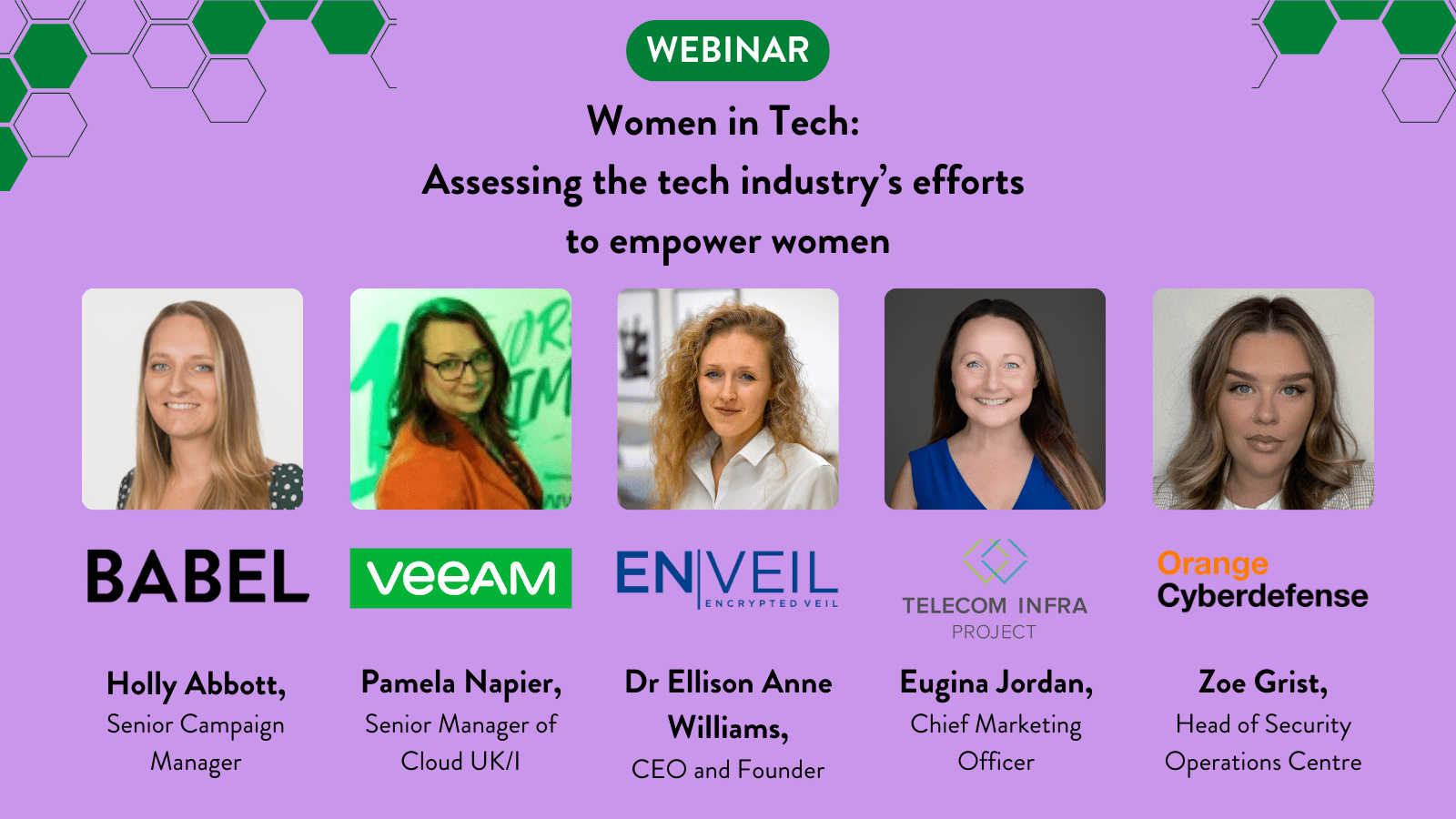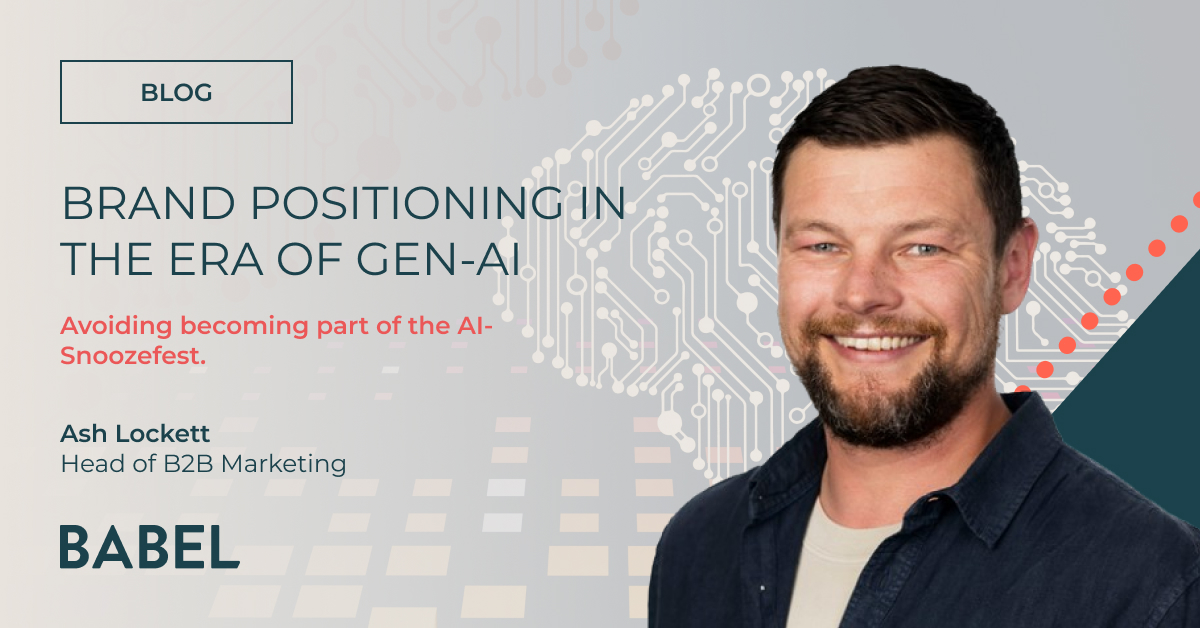
Assessing the tech industry’s efforts to empower women – women in tech webinar debrief
Last week, Babel hosted its inaugural women in technology webinar, focusing on putting the tech industry under a microscope to figure out whether the industry is really doing enough to encourage women into the sector – and whether they are doing enough to retain women in the industry.
We were lucky enough to be joined by an inspirational panel of women from all corners of the technology industry. Our panel featured Pamela Napier (Senior Manager of Cloud for the UK and Ireland at Veeam), Ellison Anne Williams (CEO and Founder of Enveil), Zoe Grist (Head of SOC at Orange Cyberdefense), and Eugina Jordan (CMO at Telecom Infra Project). The webinar was moderated by one of our Senior Campaign Managers here at Babel, Holly Abbott.
Keep reading for a lowdown of the conversation…
Has the industry changed since our panellists started out in the world of technology?
Awareness of women in technology and increasing gender diversity in the sector has definitely become more of a priority over the past decade. When asked this question, Pamela argued that her negative experiences in the industry were rooted in her own misconceptions and lack of confidence that she had at the start of her career, rather than treatment from her male co-workers. At the time of the webinar, Pamela had just celebrated 20 years in the industry and recalled her first day of working in technology when she walked through the door and was the only female in the room.
She stated that this experience was initially quite daunting and caused her to put a lot of extra pressure on herself to fit in, to be as good as everyone else, and to show no weakness. This feeling was only heightened when she fell pregnant shortly after starting her role, and she felt like she had to go out of her way even more to prove her worth. Pamela had the same experience with her second child, again putting unbelievable amounts of pressure on herself to succeed, which lead to her giving birth prematurely due to stress.
Her key takeaways from this experience were that, ultimately, she was no different to the people around her and, in fact, she had a great support network of men who truly wanted to see her succeed. Throughout her pregnancies, her male colleagues were the people telling her to slow down, and it showed her how valuable a supportive environment can be to a woman starting out in the tech space.
Eugina related to Pamela’s story, stating that she worked straight up until the day of her delivery and even after a complicated C-section, returned to work only two days later. She recalled that the men around her were cheering her on and telling her how much of a valuable asset she was to the team when in reality she should have been resting instead of putting pressure on herself to return to work. Eugina encouraged all women in the audience to not do the same, as it is not needed to succeed. When discussing her thoughts, Eugina referenced a key piece of data which showed that only 12% of the C-Suite in the telecommunication sector are female – meaning that we have a long way to go! She believes that this is due to a lack of sponsorship. Eugina gave a simple example of what this can look like – simply making a point of highlighting and saying a person’s name when they are not there, which will indirectly help them to gain more career opportunities and develop professionally.
Offering a different perspective from a woman in technology, Ellison Anne told of her experience in working with a team where she was the only female. She recalled being surrounded by an extremely supportive group with fantastic mentors. Ellison Anne also mentions that she is a mum of five who worked up until the day she delivered on each of her pregnancies, but not because of pressure from her team – she worked as hard as she did because she chose to, and loved what she was doing. This scenario is one that we can only hope becomes the norm as more initiatives are put in place to support women in technology roles.
Providing another interesting perspective, Zoe discussed her experiences working in the police force in comparison to working in the technology sector. Zoe explained that while the police force is a heavily male-dominated industry like the technology space, there are some key differences. Zoe described the effort that she sees the technology industry putting into trying to get more women into these roles as well as actively celebrating women. When comparing it to the police force, Zoe argued that the police force is arguably more “stuck in its ways” and that while both industries are male-dominated the technology space seems to be doing a better job of trying to change this fact.
“Do you think that women are being represented enough in the technology trade media?”
For this question, we opened up the floor to the audience and asked them whether they thought women were being represented enough in the technology trade media. Here were the results:
- No – 80%
- Unsure – 20%
In response to this, we asked Eugina what we can be doing from a marketing perspective to increase this representation in the tech trades. Eugina stated that we all need to be taking a stand against gender-based discrimination and that senior men whom the media wants to hear from need to help women get the same opportunity by taking a stand and helping them to be visible.
Pamela also contributed to this discussion and said that Veeam allowing her to spearhead conversations around cloud and data protection has been a very positive move for the company and has opened them up to an entirely different audience. She believes that female spokespeople not only help to give a voice to the women in the technology industry but will also encourage other women to get involved in similar conversations.
“As a male in the industry, what are the things that we can do to support our female colleagues in the sector?”
Did our panellists have any specific role models when they entered the world of technology?
Written by Lauren OHarrow
PR Assistant





